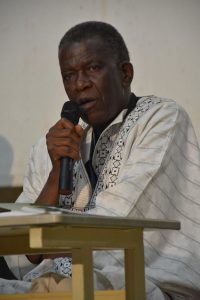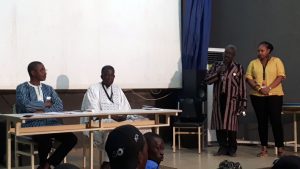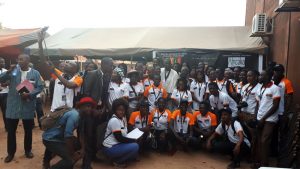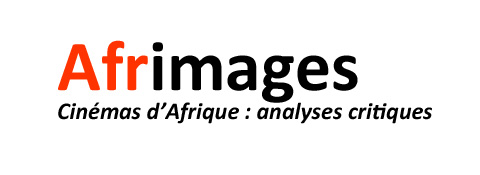(translation from the article published in french on Africultures) Ouagadougou February 28th, 2019: supported by Africalia, the cinema lesson takes place in front of an audience of ISIS students during Fespaco. This time with the Malian filmmaker Cheick Oumar Sissoko. The summary can be found here. Former Minister of Culture, elected Secretary General of the Pan African Federation of Filmmakers (FEPACI) in 2013, President of the African Solidarity for Democracy and Independence (SADI), he answers questions from the Burkinabe critic and writer Saïdou Alceny Barry, as well as the students in attendance.
Saïdou Alceny Barry: Cheick Oumar Sissoko was born in San, Mali on December 21st, 1945. He studied history and sociology in Paris, where he obtained a postgraduate diploma (DEA) in history. He then studied film history at the École Nationale Supérieure Louis-Lumière. When he returned to Mali, he became a director at the National Center of Cinematographic Production (CNPC) where he made corporate and fictions films, as well as documentaries. Quoting Nyamanton (1986), “I learned a short time ago that in al his filmography, it is the film that he loves the most.” In 1989, he directed Finzan, then Etre jeune à Bamako in 1992. In 1995, he directed Guimba the Tyrant that discusses the dictator of Kéniéba. In 1999, he returned with Genesis, an adaptation of the biblical text. In 2000, he directed Bàttu – an adaptation of The Beggars’ Strike by Aminata Sow Fall (1979) – which won the RFI Public Cinema Award at Fespaco in 2001. Finally, he directed Rapt à Bamako in 2014. We could also mention his political engagement as he created a political party and served as the Minister of Culture. He never left politics, he made politics with cinema.
In this masterclass, we will ask him to discuss the constraints and opportunities of directing, in the context of technological evolution. We will equally touch upon the inspiration derived from creation. All of the arts (written, visual, etc.) nourish cinematographic creation, which pushes us to go beyond cinema, especially for adaptations. This is the case for Genesis, Bàttu, and Rapt à Bamako. Finally, we will discuss cinema and political combat.

Cheick Oumar Sissoko: I studied science in Paris (math and science) and started my political career there. I was a member of various national associations in Paris and the Black African Students Federation in France. When I worked to finance my education, I was a union member in the largest French union of the time. In the 1970s, I was part of a front of people of France against dictatorships, against the Vietnam War. In this mold, and in this student union, I asked myself the question: how to succeed in pursuing my ideals of social justice on a continent that was strongly marked and beaten by dictatorships. Here is my reflection: image has imposed itself on me as a genuine tool that builds a dialogue with the population, and then awaken consciences. Collective consciousness is a determining factor in the assumption of responsibility by citizens. A single film can define a whole manifesto and reveal a whole way of living (customs, traditions, behaviors). So I ended up choosing cinema, especially since I went to see a lot of Italian films, which were fashionable at the time. You must have seen Bicycle Thieves. I went to a cinema in Paris, which was always open to this kind of films. And I also watched Soviet films by Eisenstein. I also saw The Wagoner (Borom Sarret) and Mandabi by Sembène Ousmane, at the Racine in the street of the same name. They reinforced my belief that cinema could help me contain my ideals. I met people, but since there was no freedom of opinion, assembly, and association, that was the solution. So I said to myself that I had to study the history of society to understand it. So I went to film school and got a degree in history and sociology. I had to do a PhD, but I didn’t want to teach at university, so I didn’t.
Saïdou Alceny Barry: Now touching on the question of literature and oral tradition, stories.
Cheick Oumar Sissoko: I want to advise young people to never forget to talk to people, especially the elderly. In our stories, our myths and our legends, there is an interest conducive to learning and to knowledge, which can give us ideas. They must also not forget to get into the arts. After my film studies, I understood the “chiaroscuro.” When viewing a painting at the State Hermitage Museum, it brought me back to my classes on stage lighting, which I had never succeeded in understanding. It jumped out at me ten years after my studies! It’s interesting to read novels. Read a lot. We can’t make films with deep content if we don’t have a knowledge of history, of world history, and of societies. I’m not saying that you have to get a masters degree in literature. But it’s a lot of reading. Here, in Burkina Faso, you are lucky to have Joseph Ki-Zerbo. I also recommend Amdaou Hampâté Bâ, a Malian writer. You have your novelists, and you have to read them. Why do you have to read them? Because it’s knowledge, it’s adventure, it’s the know-how of writing a story, and the art of dialogues (to allow you to navigate situations of conflict). One cannot be a screenwriter if one cannot describe and develop the story, and thus set up a dramatic situation. It’s important to read. It gives you ideas and you can make adaptations. I didn’t choose to do direct Genesis someone brought Genesis to me when I was looking for a script to make a film about fratricide. When I finished filming Genesis in the city of Djenné in January 1994, a hundred kilometers away two people had killed each other and there were around twenty deaths. And in Paris, there was a tragedy related to racism, racism that was developing in the world. In South America, there were also ethnic conflicts. For each film, I was challenged and looked for a story that suited me. It was at this moment that a former screenwriter was looking for someone to direct his story. But I didn’t do it right away. It took me three years to study Genesis, as a Muslim. I met writers and archbishops in Abidjan and Bamako. I went to Lyon to meet Jesuits who advised me on the books that I read. It took months. The lesson that I learned from it is that a film is not so simple and quick to make. A film is made on the basis of an understanding of the story that we are going to shoot. You have to know the conflictual, emotional, dramatic, and psychological elements of it. Otherwise, you screw up.

Saïdou Alceny Barry: All of this is very demanding. Are there moments when technology becomes a handicap, a technical limite?<strong?>
Cheick Oumar Sissoko: You really have to master the script and prepare it beforehand. But making a film is also constant preparation before the actual filming. During this preparation, changes can be made that are not always easy and economical for the director, who has already taken stock of the real cost of the film, and who wants to make profits from his investment. So we have to anticipate technical and financial concerns. Once you have a perfect knowledge of the scenario, you live with it, walking, eating, waking up…! It’s a pressure.
I had very good teams on these two films. I usually film with two foreigners: the chief operator and the sound engineer. All the others were Africans from Mali and Burkina, notably a very good chief electrician, Maïga. The costume designer and the set director were from Mali, and the head of makeup was from Burkina Faso.
On Guimba the Tyrant and Genesis, I had planned the sets in order to know which material to use, so that everyone could measure the architecture and the lighting of the locations. You have to do day and night tests, even on digital. If the camera breaks, you have to change it. So, it’s necessary to leave notation at the lab and run tests (back focus). It happened to us on Guimba the Tyrant: in the middle of the afternoon, the camera fell. If we hadn’t done all of that, they would have sent us a different camera. In addition, with the changes in technology, we have to run tests. Casting is another essential element. For me, 40% of the success of the film is thanks to good casting. We need actors who we know psychologically, because we cannot work with people with whom we share conflicts. Even if they are already extremely difficult, we are obliged to know them. Sometimes, some need to be guided and accompanied by someone. That is the job of the director and their assistant. Never forget to respect that.
Olivier Barlet came to see me on the set of Genesis for a report. He is in the room and he can testify to it. I was always waiting for everyone to come it. I was worried about everyone, because we are not in situations of real professionalism and we do not pay people at an intriguing level. They were given 7,700 CFA a day, as well as three meals a day because you have to motivate and respect people. The choice of technical equipment is important. That is the producer’s problem. If we take these precautions, we can minimize any possible slippage.
Saïdou Alceny Barry: And digital? What is the impact of the tool on the creator?
Cheick Oumar Sissoko: The reel entailed some creativity. You could touch it and see on the editing table what you could do with it with the editor. With digital, all of that is finished. It’s the computer that manages everything. It’s the master of tomorrow (except for those who know how to handle computers well). Many among us find that the creativity changes completely. But by switching from DVD to Blu-ray, by changing the cameras according to the cards we put in them, I think we’re getting closer to a better quality. We have to go to digital because it opens up a lot of opportunities. Greenscreens allow us to do special effects that were difficult otherwise. Now we can do it directly on the computer, thanks to specialized laboratories, with much more quality and precision. I did some special effects in Genesis but if I had done it today, it would have worked much better. It was terribly expensive for just three seconds!

Question n°1 from the audience – Have you adjusted well to the transition from film technology to digital?
Cheick Oumar Sissoko: Me, I’ve handled it well. I was taking part in an American production in 1997 to shoot a documentary film about women struggling against the Apartheid. It was a film shoot in South Africa. And a second film shot in Eritrea, about nation building. Eritrea had just finished its war with Ethiopia. The Americans arrived with their equipment, which was not widely revealed at the time. They had digital cameras that I really didn’t know anything about. It was a very good situation for me, especially during editing. I noticed the quality of the work. We had a light team. I was surrounded by a Ghanaian team and an American chief operator. We had very little equipment, and I had no assistant, no sound engineer, but the cameraman had one. At the time, the equipment was heavier than what we have now. I saw the convenience of work, the reduced cost of travel, accommodations, food, wages… I saw the ease of the editing. It used to be an eternal cycle. It was necessary to search. Because when you film one shot in twenty takes, and you pick three of them, then you realize that the three are not good, you have to take the other seventeen. I was amazed at the speed of the editing. But I wasn’t in control of the situation, of the creativity. Then, I directed Bàttu and once it was filmed, we digitized everything to work digitally on the editing. It was a second apprenticeship for me. We finished it in 2000, and I was appointed minister in 2002. For five years, I was completely outside of cinema. I once directed a film on AIDS. But I shot it during the night (from 7:00pm to 3:00am). When I left the political sphere, I was afraid to engage in filmmaking. I went with others to discover the new formats and their impact. I’m no further ahead than you are. I understood that there are cameras that are very easy to manipulate. I advise that you not just leave the control to the cameraman and the chief operator. I went to a film school where technique was important. During the first two years math and physics were compulsory, for the optics of the camera and for the composition of the film reels. In math, I studied space and sound. You have to master all that, even in the digital age. In my opinion, it is necessary to know the light and the quality of the image in the digital.
In terms of light, the difficulty remains as the choice and control of digital material. Another advantage is that we are not limited by film sizes. On Rapt à Bamako, I was able to do twice as many dailies without the cost. It’s especially the time that costs something. At the time, for 100,000 francs, we had four minutes. To make an hour worth of time, it was 900,000 francs. It took ten hours of work for nine minutes of film. The equipment was extremely expensive.
Question n°2 – After the presentation of Bàttu at Fespaco, we didn’t hear anything more about it. What happened?
Cheick Oumar Sissoko: I’m not the producer of Bàttu, it’s a French production. They put it under lock and key. The Society of Dramatic Authors and Composers informed me, and I put myself on the list of buyers. I was able to buy the film for 15 million CFA. It was nothing for a film made with 1,250,000,000, because there were great actors, including Dany Glover (American actor). At the time, a French chief operator was paid 1,220,00 a week, as well as a four- or five-star hotel to house them, not counting 51% payroll tax. That was really excessive. Never forget about copyright. Look for a lawyer who can uphold it. My lawyer was able to get the last word for me to buy it, but then we found out that there were 52 million backlogs to resolve. So for the moment the film is stuck but we will try to release it. It is adapted from the book of the great novelist Aminata Sow Fall, and the FOPICA, the aid fund of Senegalese cinema, can help us in this regard.
Question n°3 – Should the cinema be seen as a business?
Cheick Oumar Sissoko: How can we structure the economy of the cinema, professionalize the industry and train people? The schools in which you find yourselves mustto increase the level of their training. If you’re trained, and we have post-production, distribution, and operating companies working with the theaters, you’ll be able to make films, products that can be profitable and can expand the market. The example of Nigeria is worth pondering.
Question n°4 – How can you recognize TV movies?
Cheick Oumar Sissoko: a TV movie is reduced in terms of the filmed fields. The story is not complete. I will not get into the theoretical debate. I made the TV movie Rapt à Bamako, it made people laught but it wasn’t a success!
Cheick Oumar Sissoko: As I like to say, fulfilling our mission is to formalize the way we live on the screen, to suffer, to struggle, to take pleasure, and to love. I make films to talk about Africa and unacceptable situations, in order to advance my political fight. For me, every film has a psychological substance. In any case, we are engaged in making a film because we are addressing a subject, we are conveying a message, we have a story to tell that is related to a social problem. I want to make a contribution to this continent, which is marginalized, which offers miserable living conditions to its people. I consider myself a filmmaker who makes art films.
Question n˚6 – Does the FEPACI plan to open a film school?
Cheick Oumar Sissoko: Film schools are important: They provide training in all of the professions of the cinema. Editing is also essential, this is where the real creation is. At the end of my studies, I did three months of editing and that’s when I understood everything. We have a business plan of 200 billion CFA accepted by the African Union. The African Development Bank asked the African Union to invest in the business plan because it wanted to intervene to the tune of 50 billion CFA. We need a partnership between the public and the private. We insist that schools should be able to train young Africans at the same level as young Asians and Americans. We must fight this battle for our continent. The continent needs to see its own image. There is a lot of cheating and lying on television. We are completely destabilizing a situation. That’s why we need high-performing schools. We can encourage them.
Question n˚7 – How can African women succeed in creating their space in the seventh art (filmmaking)?
Cheick Oumar Sissoko: They are there, they are in school Do you think they are in school to watch men win awards? laughing We have more and more women making great movies. When we created the festivals in Africa, the problem was not that it was a woman or a man who won the award. It has to be based on the quality of the film.
Question n˚8 – What role does humor have in your films?
Cheick Oumar Sissoko: Humor often allows people to take an interests in history. That is the choice I made. In Finzan, the violence is hard to bear because it is levirate: a woman is forced to marry the younger brother of her deceased husband, and then it is female genital mutilation; so I put humor into it. I also did it for Nyamanton, Guimba the Tyrant and Genesis. Genesis addresses a fratricidal conflict where ranchers kill farmers. I build a dialogue between the viewer and the director to make the film work. I choose this in the drama I organize. Humor brings out a serious story. And it amuses me.
Question n˚9 – Should we always be content with localized subjects?
Cheick Oumar Sissoko: Why not? We were convinced that our films could not be distributed in the national language. Yeelen (Brightness) in Bambara and Tilaï (The Law) in Mossi won at Cannes, films in our national languages. Guimba the Tyrant has been broadcast everywhere, Genesis has been officially selected in Cannes. We need to win. Our languages are our future. Where I come from, 50% of people don’t speak French. We have to make our films in our language.
Saïdou Alceny Barry: Any last advice for the students?
Cheick Oumar Sissoko: Here’s my advice: never forget that you need to know your goals, and analyze because on the set, you need to know where to put the camera (at what height, and with what lens). It’s not complicated, with practice. You make it easier for the cameraman. If you know how to draw, then make your outlines. You must plan ahead with your assistant. Talk to people and give them confidence (especially actors who sometimes need someone to accompany them). It is a collective art and you are the coordinator.
Living the festival is a privilege. Let’s enjoy it, enjoy it. Make them life tools that will allow you to fulfill your career desires. Be collective, a community with goals, offer quality through the requirement, give importance and respect to others, be engaged. All of humanity is watching you. You have to take responsibility. responsibility is important. Watch a lot of African films. You are artists and especially artisans of development (applause).
Translation : Madelyn Colvin

